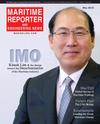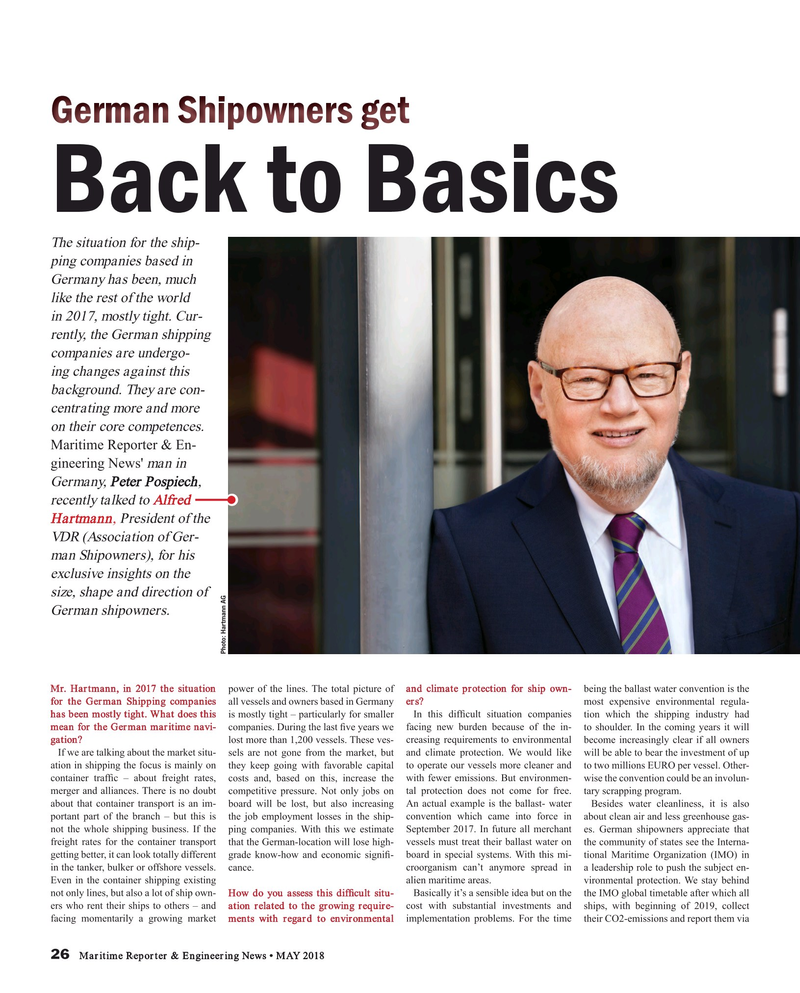
Page 26: of Maritime Reporter Magazine (May 2018)
Marine Propulsion Edition
Read this page in Pdf, Flash or Html5 edition of May 2018 Maritime Reporter Magazine
The situation for the ship- ping companies based in
Germany has been, much like the rest of the world in 2017, mostly tight. Cur- rently, the German shipping companies are undergo- ing changes against this background. They are con- centrating more and more on their core competences.
Maritime Reporter & En- gineering News' man in
Germany, Peter Pospiech, recently talked to Alfred
Hartmann, President of the
VDR (Association of Ger- man Shipowners), for his exclusive insights on the size, shape and direction of
German shipowners.
Photo: Hartmann AG
Mr. Hartmann, in 2017 the situation power of the lines. The total picture of and climate protection for ship own- being the ballast water convention is the for the German Shipping companies all vessels and owners based in Germany ers? most expensive environmental regula- has been mostly tight. What does this is mostly tight – particularly for smaller In this dif? cult situation companies tion which the shipping industry had mean for the German maritime navi- companies. During the last ? ve years we facing new burden because of the in- to shoulder. In the coming years it will gation? lost more than 1,200 vessels. These ves- creasing requirements to environmental become increasingly clear if all owners
If we are talking about the market situ- sels are not gone from the market, but and climate protection. We would like will be able to bear the investment of up ation in shipping the focus is mainly on they keep going with favorable capital to operate our vessels more cleaner and to two millions EURO per vessel. Other- container traf? c – about freight rates, costs and, based on this, increase the with fewer emissions. But environmen- wise the convention could be an involun- merger and alliances. There is no doubt competitive pressure. Not only jobs on tal protection does not come for free. tary scrapping program. about that container transport is an im- board will be lost, but also increasing An actual example is the ballast- water Besides water cleanliness, it is also portant part of the branch – but this is the job employment losses in the ship- convention which came into force in about clean air and less greenhouse gas- not the whole shipping business. If the ping companies. With this we estimate September 2017. In future all merchant es. German shipowners appreciate that freight rates for the container transport that the German-location will lose high- vessels must treat their ballast water on the community of states see the Interna- getting better, it can look totally different grade know-how and economic signi? - board in special systems. With this mi- tional Maritime Organization (IMO) in in the tanker, bulker or offshore vessels. cance. croorganism can’t anymore spread in a leadership role to push the subject en-
Even in the container shipping existing alien maritime areas. vironmental protection. We stay behind not only lines, but also a lot of ship own- How do you assess this dif? cult situ- Basically it’s a sensible idea but on the the IMO global timetable after which all ers who rent their ships to others – and ation related to the growing require- cost with substantial investments and ships, with beginning of 2019, collect facing momentarily a growing market ments with regard to environmental implementation problems. For the time their CO2-emissions and report them via 26 Maritime Reporter & Engineering News • MAY 2018
MR #5 (26-33).indd 26 MR #5 (26-33).indd 26 5/3/2018 10:56:55 AM5/3/2018 10:56:55 AM

 25
25

 27
27
